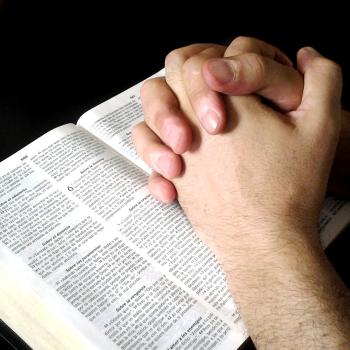When I was young and single, a slightly older married friend of mine told me that being married meant you said “sorry” a lot.

Image via Pixabay
He said, “You see yourself in new ways, through your wife’s eyes, and sometimes that means you see your faults like never before. It’s like a great big mirror being held up to you, and you realize how wrong you can be.”
I never forgot that, and carried it with me into my own marriage years later.
I’m not always wrong when my wife and I have a disagreement, but I am often wrong. At the very least, there is almost always some lesson that I need to learn in such times.
Marriage becomes a great arena of humility, if we will allow it to be.
The act of living together as one, although two distinct people, can call our actions, words, motives, etc., into a rather harsh perspective.
If you are married and aren’t saying, “I was wrong” at least occasionally, you might not be a great spouse.
Beyond just the marriage example, as followers of Jesus, we are all called to the path of humility, which, amongst other qualities, also acknowledges when we are wrong.
Consider the Parable of the Pharisee and the Tax-Collector:
9 To some who were confident of their own righteousness and looked down on everyone else, Jesus told this parable: 10 “Two men went up to the temple to pray, one a Pharisee and the other a tax collector. 11 The Pharisee stood by himself and prayed: ‘God, I thank you that I am not like other people—robbers, evildoers, adulterers—or even like this tax collector. 12 I fast twice a week and give a tenth of all I get.’
13 “But the tax collector stood at a distance. He would not even look up to heaven, but beat his breast and said, ‘God, have mercy on me, a sinner.’
14 “I tell you that this man, rather than the other, went home justified before God. For all those who exalt themselves will be humbled, and those who humble themselves will be exalted.” (Luke 18.9-14)
To follow Christ is to be one who knows they are a sinner. In that sense, we are wrong before God.
However, we don’t wallow in that hopelessly, as we also believe that Jesus loves us and has set us free from our sins by His blood (Rev 1.5)!
So we look to the Scriptures, we see what they declare righteousness and sinful, and we allow the Holy Spirit to show us where we are wrong, that we might repent and receive forgiveness and purification (1Jn 1.9).
But we also remember that many who revere the Scriptures can still come to wrong conclusions about how to interpret it.
We believe the Word of God is infallible. We who read and interpret it are not.
I imagine that every single one of us will get to Heaven and learn that we got some stuff wrong. Surely God is far too big for us to “master” our understanding of Him in this life.
A few years ago my church was wrestling through a tricky theological matter, and we spent several meetings gathering together, opening our Bibles, praying, and discussing the matter. There was a reasonable biblical argument to be made on both sides of the issue. There were passionate people on both sides of the issue, both sides believed the Scripture was on their side, and although we are a loving group, there was always potential for things to get heated in times like this.
Before we started these meetings, I would stand up to open in prayer, and I would invite everyone in attendance to sincerely repeat this phrase after me:
“I. Might. Be. Wrong.”
This was the posture that I wanted as we discussed the matter. Everyone needed to be humble enough to acknowledge this.
And the talks went very well.
And so, regularly and constantly, whatever theological, practical, marital, relational, financial, etc. issue that we are facing, we can pray something like this prayer:
“Lord, you are perfect, and I am not.
Your Word is perfect, and I am not.
Your theology is perfect, and I am not.
I bring my sin and selfishness and baggage to the table, which can make it hard to see clearly.
If I am wrong, show me that I am wrong.
If I need correcting, correct me.
If my understanding is flawed, make it clear to me.
May I find the truth in Your Word, and may I follow in the footsteps of Christ, as I seek to live in Your will and Your will alone.”
This humility is the posture we are to take.
It calls us to humility before God, and humility before one another.
It calls us to a place of dependent prayer and sincere and devout searching for wisdom and truth.
It calls us to change paths if we are on the wrong one, and to regularly review our thinking thoughtfully and prayerfully and biblically.
It calls us to remember the Pharisees, and even spiritual giants like Barnabas and Peter, who served God and loved Scripture but still got things wrong at times.
It calls us to remember the tremendous amount of grace and patience that we need ourselves, and to extend that same grace and patience to one another.
It calls us to be OK with the fact that we are probably wrong about some things right now, and that’s normal, and that when we search and seek the truth and are sometimes corrected and find what is right, we are better off.
It calls us to trust in the Lord, and in His leading, and in His truth, and in His grace.
And this is a great place to be.
********
If you’ve enjoyed what you read here, you can follow Third Way Christians on Facebook or Instagram, or sign up here to get new columns emailed directly to you! As well, you can track along with Chris’ Sunday morning teaching at Meadow Brook Church’s YouTube page!












